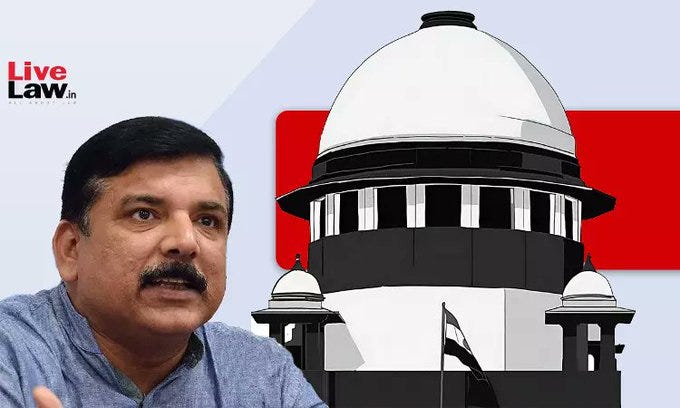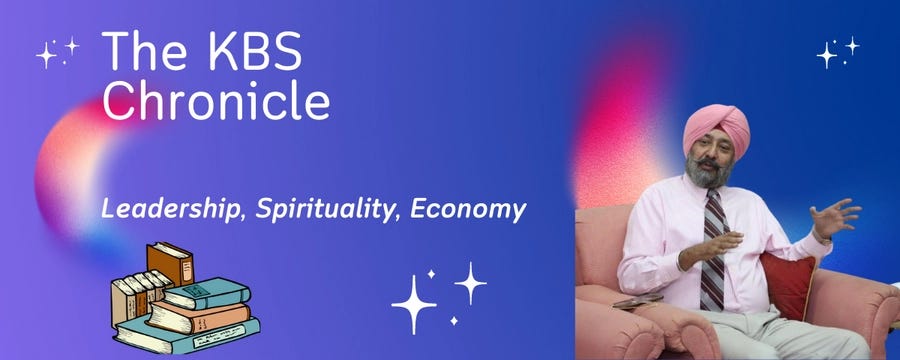Sanjay Singh, AAP MP Granted Bail by Supreme Court in ED's Delhi Liquor Scam Case
Technically, the Additional Solicitor General representing ED granted a "No Objection" but the mind of the 3-Judge Bench seemed clear.
Supreme Court Grants Bail to AAP MP Sanjay Singh
In a significant development today (April 2), the Supreme Court of India granted bail to AAP Rajya Sabha MP Sanjay Singh, who had been in custody since July 6, 2023, following his arrest by the Enforcement Directorate in the Delhi Liquor Policy case. This decision unfolds against the backdrop of Delhi Chief Minister and AAP Supremo Arvind Kejriwal's remand to judicial custody till April 14 in the same case, suggesting potential implications for upcoming legal proceedings. The bail was formally granted by the Apex Court— immediately after the lunch recess—after the Additional Solicitor General SV Raju, on behalf of the ED, submitted a formal "no objection," indicating a pivotal moment in the case, especially ahead of Kejriwal's writ petition in the Delhi High Court, challenging the arrest's legality, scheduled for April 3.
Arguments and Bench Deliberation
The three-judge Bench, consisting of Justices Sanjiv Khanna, Dipankar Datta, and PB Varale, deliberated over the comprehensive arguments presented by Senior Advocate Dr. Manu Singhvi in Sanjay Singh's defence, in the pre-lunch hearing. The Court's decision, while judicially recorded as being based on a “no-objection” by the ED, was arguably influenced by the substantive, well-articulated arguments from Dr. Singhvi. The detailed court proceedings, extensively reported by reputable law web portals, highlighted the convincing case made by Dr Singhvi, which led the Bench to all but independently conclude that a case for bail was made out the merits of the case. This judicial outcome is expected to have a considerable impact on the legal landscape surrounding the Delhi Liquor Excise Scam, setting a precedent for the handling of similar cases.
Our Immediate Tweet
Immediately as the verdict was out, we tweeted:
“Sanjay Singh, AAP Rajya Sabha, MP granted bail by the Supreme Court of India, in the Delhi Liquor Excise PMLA case.
The bail was granted on the submission of “no objection” by the central government Law Officer, ASG Raju, representing the ED.
This was a strategic retreat by the ED, since the 3-Judge Bench had made it very clear that they were inclined to grant bail, in which they would be enjoined upon to record their satisfaction under section 45 of the PMLA that Sanjay Singh did not prima facie commit an offence of money-laundering.
This would have been effectively an order of acquittal. Hence, the ED chose to follow a conservative approach and Sanjay Singh has been granted bail subject to “no objection” of the ED, without recording the discussion on merits. He’s also permitted to carry on with his political activities, including canvassing.”
Summary of the Arguments of Dr Singhvi
Dr. Singhvi emphasized the importance of assessing the "necessity" of arrest as critical to Section 19 of the Prevention of Money Laundering Act (PMLA), referencing the Vijay Madanlal Chaudhary judgment to argue that arrest should not be mechanical and requires a higher threshold. He highlighted the lack of inculpatory evidence in the statements made by Dinesh Arora, a key figure in the case, and pointed out inconsistencies and the absence of direct accusations against Singh in the chargesheets and statements referenced by the prosecution.
Justice Khanna engaged with Dr. Singhvi on several points, probing the nuances of the PMLA, especially regarding the requirements for attachment of assets and the definitions of predicate and PMLA offenses. Despite the Additional Solicitor General SV Raju's readiness to respond, the Bench preferred to hear the arguments from Singhvi's side first.
Dr. Singhvi argued that the allegations against Singh were vague and lacked corroboration, asserting that the prosecution's reliance on certain statements while disregarding others was a travesty of justice. He contended that the necessity for arrest was not met, citing judicial precedents that set a high threshold for the basis of arrest under the PMLA.
Justice Khanna: “Nothing has been recovered, there is no trace. You argue on merits, if we feel instructions are required, we will list on Tuesday Court”. These concluding remarks in the open court would surely have impelled ASG Raju to obtain instructions.
“No objection” of ED after Lunch Recess and “Bail Granted”
In the end, after a brief recess, the Court reconvened to hear that the ED, represented by ASG Raju, chose not to contest Singh's bail plea on the merits, considering the peculiar facts of the case. Justice Khanna then pronounced that Sanjay Singh was granted bail during the pendency of proceedings, with conditions to be set by the trial court. The court clarified that this concession by the ED should not be seen as a precedent and that the Court was not making any comments on the merits of the case itself.
This hearing not only granted bail to Sanjay Singh but also dismissed a second petition filed by him against the ED's arrest and remand as infructuous, underlining the court's stance on the application of the law and the importance of evaluating the necessity of arrest in PMLA cases.
Implications for the Political Landscape
The Supreme Court's decision to grant bail to AAP Rajya Sabha MP Sanjay Singh in the contentious Delhi Liquor Excise case marks a potential inflection point in the trial, which could reverberate through the political corridors of India, especially in the lead-up to the Lok Sabha elections. While spokespersons from AAP and BJP will inevitably lock horns, offering contrasting narratives, independent observers suggest that the ramifications of this judicial outcome extend far beyond the courtroom, including the bail applications of the co-accused such as Arvind Kejriwal, Manish Sisodia and Satyendra Jain, all of them currently lodged in judicial custody in Tihar Jail.
It underscores a critical moment in the judiciary's role in political disputes, possibly influencing public perception and the strategic manoeuvres of political parties. As India gears up for the Lok Sabha elections, the unfolding of this case may well shape the electoral battleground, highlighting the intricate interplay between the judiciary, politics, and public policy in the world's largest democracy. This pivotal moment could set the tone for the electoral strategies of major political entities, underlining the significance of legal outcomes in the broader political discourse and potentially affecting the electoral choices of millions.






